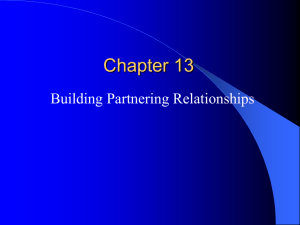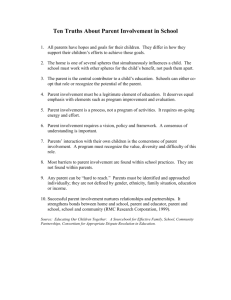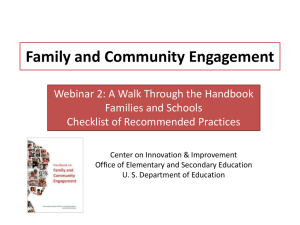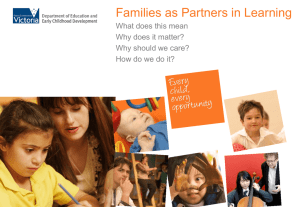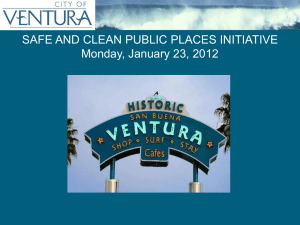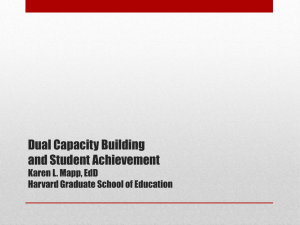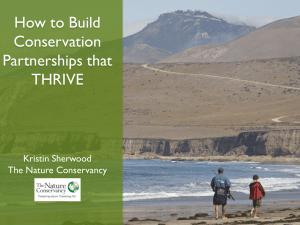DOWNLOADFdSc Marine Conservation
advertisement
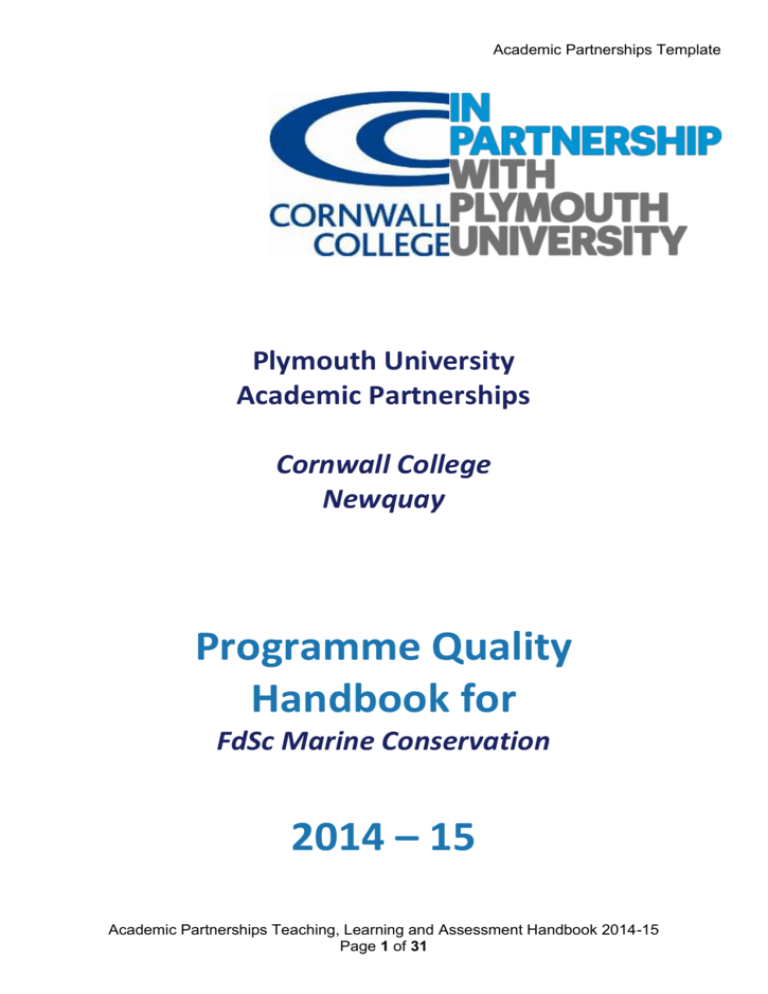
Academic Partnerships Template Plymouth University Academic Partnerships Cornwall College Newquay Programme Quality Handbook for FdSc Marine Conservation 2014 – 15 Academic Partnerships Teaching, Learning and Assessment Handbook 2014-15 Page 1 of 31 Academic Partnerships Template Contents 1. Welcome and Introduction to Marine Conservation ................................................................................ 3 2. Programme Specification ........................................................................................................................... 4 3. Module Records ....................................................................................................................................... 18 Academic Partnerships Teaching, Learning and Assessment Handbook 2014-15 Page 2 of 31 1. Welcome and Introduction to Marine Conservation. Welcome to the Foundation Degree in Marine Conservation. The College is delighted that you have chosen to study with us. Achieving a place on this course is invariably the result of hard work and determination. You will now be mixing with fellow students from a wide range of backgrounds – some straight from school, some from college access programmes and others who have been working for some time and have decided to pursue a career change. If it all feels a bit strange at first, don’t worry because everyone else will be feeling the same. Take my word for it; those around you who seem to be in complete control are no more than convincing bluffers! We are sure you are going to have a great time here and will get a great deal from the programme. This programme has been designed to equip you with the skills and knowledge base required to work in your chosen specialism or other graduate opportunities. It is also a platform from which you can undertake additional vocational and academic qualifications. The first year of any degree is the start of a process of change and by the time you enter your second year you will be thinking quite differently from how you do now; more analytically, more logically, with a clearer understanding of basic principles. There may be times when you feel over-stretched, frustrated, perhaps even under-challenged, but these will be outweighed by the exhilaration of producing and understanding work with intellectual rigour and a sense of achievement when you successfully complete your first year. You will have some great times in the next two years, but it would be unrealistic to think there won’t be any bad times and the key is to maintain a balance in your social life and your College commitments. Have a good social life – go surfing, sailing, etc, but make sure you: attend classes; keep up with your reading and research; complete coursework properly and hand in on time; revise thoroughly for exams. If you follow these simple rules, you’ll have your Foundation Degree in two years and some significant memories which will stay with you forever. This Programme Quality handbook contains important information including: The approved programme specification Module records Note: the information in this handbook should be read in conjunction with the current edition of the College / University Student handbook available at (college to add link) which contains student support based information on issues such as finance and studying at HE along with the University’s Student Handbook - https://www1.plymouth.ac.uk/studenthandbook and your Teaching, Learning and Assessment Handbook available on your programme virtual learning environment. Academic Partnerships Teaching, Learning and Assessment Handbook 2014-15 Page 3 of 31 Academic Partnerships Template 2. Programme Specification On the following pages you will find the specification for your programme; this provides a detailed overview of the programme as a whole. It explains what you will learn and how you will be assessed throughout the two stages of your Foundation Degree. The Programme Learning Outcomes Map specifies the knowledge and skills you will develop at each stage of your Foundation Degree. PROGRAMME SPECIFICATION FOR FOUNDATION DEGREES Awarding Institution: Teaching Institution: Accrediting Body: Final Award: Intermediate Awards: Programme Title: Benchmarks Date Produced: Date of Approval: Plymouth University Cornwall College University of Plymouth FdSc or FdSc with Distinction Certificate of Higher Education (CertHE) Marine Conservation Biosciences benchmark 2007 2007 Admissions Criteria: Qualification(s) Required for Entry to the FdA or FdSc Candidates must have: Key Skills requirement/Higher Level Diploma and/or GCSEs required at Grade C and above Comments 20 credits of key skills combined with for example either GCSE or Alevels (key skills will not be accepted on their own) Normally Maths and English, Science at grade C or above– desirable Plus at least one of the following: A Levels required: 120 UCAS Tariff points from any combination of A-level/AS-level/ Vocational A-level including at least one subject studied to A2-level. Advanced Level Diploma BTEC National National Diploma with a profile of at least Pass Pass Pass (PPP); Certificate/Diploma Advanced National Certificate – Credit overall HNC/D VDA: AGNVQ, AVCE, AVS Minimum of a pass in Advanced GNVQ in science at level 3 Access to HE Pass International Baccalaureate Irish/Scottish Highers/Advanced At least two "D" level passes from Scottish Higher or the Irish Higher Highers Leaving Certificate. Work Experience Assessed on application Other non-standard awards or Assessed on application experiences Academic Partnerships Teaching, Learning and Assessment Handbook 2014-15 Page 4 of 31 Academic Partnerships Template APEL/APCL possibilities Interview/portfolio requirements Criminal Record Bureau (CRB) clearance required Individuals may be considered for APCL or APEL in accordance with the academic regulations Mature students would have to demonstrate at interview the necessary motivation, potential, experience and/or knowledge. Disabilities – the course welcomes applications from students with disabilities and is committed to its inclusive policy. In order to be more learner centred, the College requests that all applications be considered individually and in consultation with the Course Manager. All students will require this check if they may be working with young people. Aims of the Programme: a. To encourage in students an enthusiasm for biological sciences in general and the conservation of marine environments in particular. b. To develop in students the scientific knowledge, understanding and practical skills, which they will need to be able to survey and manage organisms and habitats. c. To encourage students to think critically about scientific evidence and evaluate information relating to marine environments and their conservation. d. Create an understanding of the variety of sometimes conflicting demands placed on the marine environment by such forces as biodiversity conservation objectives, fishing, aquaculture and side effects of other human activities. e. Enable students to communicate effectively in a range of contexts relating to marine sciences and conservation f. To enable students to develop their academic skills to a point where further study at Degree level becomes an option g. To allow the student to develop skills both in the college environment, and in the workplace. h. Ensure that students gain experience and understanding of marine conservation issues from the perspective of people and organisations working in the conservation sector and to a level where employment within the conservation industry is a realistic option. Programme Intended Learning Outcomes: By the end of this programme the student will be able to: a. Demonstrate knowledge of the fundamentals of biological science. b. Demonstrate an understanding of the ethical, legal, economic and political context of management of the marine environment for conservation. c. To initiate and undertake critical analysis of scientific evidence and to communicate scientific information relating to aquatic conservation. d. Function as autonomous learners equipped to cope with third year degree studies. e. Plan for suitable careers and be effective at applying for employment. f. Demonstrate the wider skills needed to be successful in employment in the environmental management sector. g. Evaluate evidence, arguments and assumptions, to reach sound judgements, and to propose solutions to problems arising from their evaluations and judgements. Academic Partnerships Teaching, Learning and Assessment Handbook 2014-15 Page 5 of 31 Academic Partnerships Template Progression Opportunities There are opportunities to progress to the following Honours degrees: BSc (Hons) Marine Biology and Coastal Ecology (year 2) – UoP BSc (Hons) Environmental Resource Management (year 3) – Cornwall College Camborne There is also the possibility of progressing on to the following programme (subject to places and grades): If you progress to the final stage of a Plymouth University programme then your stage two marks (level 5 modules) will be taken into account in your final degree classification. You may have to complete a bridging module before you are able to progress. Your Programme Manager has the support of an Academic Liaison Person (ALP) with questions regarding to progression to programmes at the Plymouth University. Please note there is a deadline for progression applications (circa mid-January with the actual date determined annually) and places maybe subject to availability. If you progress to the final stage of a Plymouth University programme then your stage two aggregate mark (from your level 5 modules) will account for 30% and your progression stage (level 6 modules) aggregate mark will account for 70% of your final degree classification. (if direct entry programmes are commented on then it needs to be clear that whether those level-5 marks are considered will depend on the specific route). Your Programme Manager has access to University staff and is able to liaise in relation to your questions regarding progression to programmes at Plymouth University. Progression routes are correct at the time of publication but they may be subsequently amended. Distinctive Features of the Foundation Degree Examples of distinctive features Work-based learning opportunities at Newquay Zoo, National Marine Aquarium, RSPB and Cornwall Wildlife Trust Progress to Honours programme in Wildlife Conservation at the Plymouth University Opportunities to work individually and on collaborative and cross-disciplinary projects. The programme offered is inspirational, innovative and memorable, and will encourage creative thinking and the development of new ideas. You will be working in an expanding field where opportunities to develop new perspectives will be encouraged. Fieldwork and fieldtrip are a major component of course. Experienced, enthusiastic and friendly staff. Small group teaching. Academic Partnerships Teaching, Learning and Assessment Handbook 2014-15 Page 6 of 31 Academic Partnerships Template Teaching Methods and Assessments A: Development of Knowledge and Understanding Knowledge and critical understanding of the wellestablished principles in their field of study and the way in which those principles have developed have an understanding of the explanation of biological phenomena at a variety of levels (from molecular to ecological systems) and be able to explain how evolutionary theory is relevant to their area of study; know and understand the structure and function of various types of cells in unicellular and multicellular organisms, the structure and function of cell membranes, cell differentiation have knowledge of enzyme structure and function and of some of the most important mechanisms controlling the action of enzymes and other proteins describe basic organism structure and diversity; describe mechanisms for the life processes and appreciate how the physiology of an organism fits it for its environment; describe how organisms are classified and identified; appreciate the interactions of organisms with each other and the environment; appreciate the importance of the 'behaviour' of the organisms studied demonstrate awareness of human interactions with natural populations and ecosystems, including habitat modification, pollution, exploitation and conservation Learning and Teaching Strategy/Method Primary Lectures and tutorials Laboratory practicals and fieldwork Learning from work experience Workshops with partner organisations NB: Benchmark References Foundation Degree benchmark 42 Biosciences: o Generic standards (threshold 3) o Molecular aspects of Biology (threshold 5 & 8) o Organisms (threshold 2,6,7 &8) o Ecology & Environmental Biology (threshold 7) Assessment Key knowledge and understanding is assessed via a combination of end of topic tests, examinations, fieldwork and laboratory reports, essays, presentations and seminar performances. B: Cognitive and Intellectual Skills Learning and Teaching Strategy/Method Primary Class exercises Tutorial/seminar discussions Feedback via coursework assessment process (essays etc) Laboratory practicals and fieldwork be able to construct reasoned arguments to support their position on the ethical and social impact of advances in the biosciences; have ability in a range of practical bioscience techniques including data collection, analysis and interpretation of those data, and testing of hypotheses gather, organise and deploy ideas and information in order to formulate arguments cogently, and express Secondary Visits to aquaria and relevant science/ natural history education venues Case studies Directed independent study Problem-solving exercises Secondary Academic Partnerships Teaching, Learning and Assessment Handbook 2014-15 Page 7 of 31 Academic Partnerships Template them effectively in written, oral or in other forms; Abstract analysis and synthesis Understanding of subject-specific theories, paradigms, concepts and principles and some understanding of more specialised areas NB: Benchmark References For example: Policy and practice analysis in seminars Computer-based practicals on data and measurement problems ES3 Benchmark Table 1: intellectual skills ( Typical performance) Assessment Assessed discussions Essays/projects/dissertations Examinations/tests Coursework/groupwork on practical application questions C: Key Transferable Skills Learning and Teaching Strategy/Method By the end of the programme the student will be able to: (for example) communicate about their subject appropriately to a variety of audiences using a range of formats and approaches, using appropriate scientific language) identify individual and collective goals and responsibilities and perform in a manner appropriate to these roles, in particular those being developed through practical, laboratory and/or field studies recognise and respect the views and opinions of other team members; negotiating skills develop the skills necessary for self-managed and lifelong learning (eg working independently, time management, organisational, enterprise and knowledge transfer skills) identify and work towards targets for personal, academic and career development develop an adaptable, flexible and effective approach to study and work. NB: Benchmark References Biosciences 3.8a Biosciences 3.9a&b Biosciences 3.10a,b & c Primary Library and other research exercises Group work awareness and practice Computer-based learning and assessment Biosciences (generic standards – threshold 2, typical, 5) Secondary Class and seminar interactions and feedback Assessment Coursework of all types Examination preparation and completion Assessed discussions Group work assessments Academic Partnerships Teaching, Learning and Assessment Handbook 2014-15 Page 8 of 31 Academic Partnerships Template D: Practical Skills Learning and Teaching Strategy/Method Ability to describe and record materials in the field and laboratory Ability to interpret practical skills in a logical manner Ability to use appropriate laboratory and filed equipment competently and safely Ability to plan, conduct and present an independent project with limited reliance on guidance Ability to present research findings in a number of formats effectively and appropriately Ability to relate investigations to prior work and to reference work appropriately NB: Benchmark References ES3 : Practical Skills (Typical Performance) Work-centred practise Laboratory and fieldwork Individual Projects Designated tasks Lectures and tutorials Learning from work Assessment Project work Assignment tasks for Fieldwork and Laboratory practicals E: Employment Related Skills By the end of the programme the student will be able to: developing the skills necessary for self-managed and lifelong learning (eg working independently, time management and organisation skills); identifying and working towards targets for personal, academic and career development develop an adaptable, flexible and effective approach to study and work NB: Benchmark References Biosciences 3.9a Biosciences 3.9b & c Assessment Project work Competence in a range of businessrelated communication techniques Academic Partnerships Teaching, Learning and Assessment Handbook 2014-15 Page 9 of 31 Foundation Degree Intended Learning Outcomes Map 1 Graduate Attributes and Skills Core Programme Intended Learning Outcomes The FHEQ requirements are already given here in italics Knowledge/ Understanding Students will be able to demonstrate a knowledge of the underlying concepts and principles associated with their area(s) of study, and an ability to evaluate and interpret these within the context of that area of study or principles of their area(s) of study. In particular: the major theories of the discipline(s) and an awareness of a variety of ideas, contexts and frameworks the wider social and environmental implications of area(s) of study and is able to debate issues in relation to more general ethical perspectives Cognitive / Intellectual Skills (generic) Students will be able to demonstrate an ability to present, evaluate, and interpret qualitative and quantitative data, to develop lines of argument and make sound judgements in accordance with basic theories and concepts of their subject(s) of study. In particular to: have ability in a range of practical bioscience techniques including data collection, analysis and interpretation of those data, and testing of hypotheses Abstract analysis and synthesis Basic understanding of subject-specific theories, paradigms, concepts and principles. Certificate Level 2 3 4 Aim Subject Benchmark NB refer to relevant Aim(s) Biosciences: o Generic standards (threshold 3) o Molecular aspects of Biology (threshold 5 & 8) o Organisms (threshold 2,6,7 &8) o Ecology & Environmental Biology (threshold 7) a, b, d Related Core Modules Marine Science Diversity, Classification and Evolution Ecology of Aquatic Systems b, c Biosciences (generic standards – threshold 2) All modules ES3 Benchmark Table 1: intellectual skills ( Threshold performance) Academic Partnerships Teaching, Learning and Assessment Handbook 2014-15 Page 10 of 31 Academic Partnerships Template Key / Transferable Skills (generic) Students will be able to demonstrate the ability to evaluate the appropriateness of different approaches to solving problems related to their area(s) of study and/or work; and to communicate the results of their study/work accurately and reliably, with structured and coherent arguments. . In particular to: interact effectively within a team / learning group, manage learning using resources for the discipline communicate effectively in a manner appropriate to the discipline (in standard English oral, written, using ICT) take responsibility for own learning with minimum direction manage information with the ability to select appropriate data from a range of sources and develop appropriate research strategies Practical Skills (subject specific) Basic ability to describe and record materials in the field and laboratory Basic ability to interpret practical results Basic ability to use appropriate laboratory and field equipment safely Basic ability to plan, conduct and present an independent project with limited reliance on guidance Basic ability to present results of investigations in a number of formats Basic ability to relate investigations to prior work and to reference appropriately h, f, e, c Personal & Professional Development Work based experience b, e, f, c, e ES3 : Practical Skills (Threshold performance) Academic Partnerships Teaching, Learning and Assessment Handbook 2014-15 Marine Science Ecology of Aquatic Systems Individual Research Project Page 11 of 31 Academic Partnerships Template Employment-related skills Students will be able to demonstrate an ability to undertake further training and develop new skills within a structured and managed environment and the qualities and transferable skills necessary for employment requiring the exercise of personal responsibility developing the skills necessary for self-managed and lifelong learning (eg working independently, time management and organisation skills); identifying and working towards targets for personal, academic and career development Other developing an adaptable, flexible, and effective approach to study and work identifying individual and collective goals and responsibilities and performing in a manner appropriate to these roles; recognising and respecting the views and opinions of other team members; negotiating skills; f, g,h Biosciences 3.9a Personal & professional Development g Biosciences 3.9b Work-based learning h Biosciences 3.9c All modules h Biosciences 3.8a Work based study h Biosciences 3.8b Bioethics Academic Partnerships Teaching, Learning and Assessment Handbook 2014-15 Page 12 of 31 Academic Partnerships Template Foundation Degree Intended Learning Outcomes Map Intermediate level 1 Graduate Attributes and Skills 2 Core Programme Intended Learning Outcomes Aim(s) (as worded in the Programme Specification) The FHEQ requirements are already given here in italics Knowledge/ Understanding NB refer to knowledge and critical understanding of the well-established principles of their relevant Aim(s) area(s) of study, and the way in which those principles have developed; knowledge of the main methods of enquiry in their subject(s and ) an understanding of the limits of their knowledge, and how this influences analyses and interpretations based on that knowledge . In particular: a, b, Understanding of subject-specific theories, paradigms, concepts and principles and some understanding of more specialised areas b Discuss and demonstrate comprehension of nutrient and energy flow through individuals, populations and communities c, d Discuss and critically analyse patterns of distribution of organisms in relation to biotic and abiotic factors Evaluate the impacts of harvesting resources, controlling pest / pathogens and different approaches to species management 3 4 Subject) Related Core Modules Benchmark (specific reference) NB refer to relevant benchmark(s) ES3 Benchmark Table 1: intellectual skills (Threshold performance) All modules Biosciences Benchmark (Ecology & environmental biology, p11 – Good) Ecology of Aquatic Systems Bioethics Academic Partnerships Teaching, Learning and Assessment Handbook 2014-15 Page 13 of 31 Academic Partnerships Template Cognitive / Intellectual Skills (generic) Students will be able to demonstrate an ability to apply underlying concepts and principles outside the context in which they were first studied. In particular to: In particular to: Understanding of subject-specific theories, paradigms, concepts and principles and some understanding of more specialised areas Have a secure and accurate understanding of the explanation of biological phenomena at a variety of levels ( from molecular to ecological systems) and be able to understand the relationship of evolutionary theory to their area of study Key / Transferable Skills (generic) Students will be able to demonstrate an ability to evaluate critically the appropriateness of different approaches to solving problems in the field of study; use a range of established techniques to initiate and undertake critical analysis of information, and to propose solutions to problems arising from that analysis and effectively communicate information, arguments, and analysis, in a variety of forms, to specialist and non-specialist audiences, and deploy key techniques of the discipline effectively. In particular to: Be able to construct reasoned arguments to support their position on the ethical and social impact of advances in the biosciences ES3 Benchmark Table 1: intellectual skills (Threshold performance) All modules Biosciences benchmark (Generic standards, Typical) All modules esp Marine Science; and Diversity, Classification & Evolution Biosciences benchmark (Generic standards, Typical, 5.8) Bioethics b,c d, e Academic Partnerships Teaching, Learning and Assessment Handbook 2014-15 Page 14 of 31 Academic Partnerships Template Practical Skills (subject specific) Ability to describe and record materials in the field and laboratory Ability to interpret practical results in a logical manner Ability to use appropriate laboratory and field equipment competently and safely Ability to plan, conduct and present an independent project with limited reliance on guidance Ability to present research findings in a number of formats effectively and appropriately Ability to relate investigations to prior work and to reference work appropriately Employment-related skills Students will be able to demonstrate an ability to apply subject principles in an employment context; undertake further training, develop existing skills and acquire new competencies that will enable them to assume significant responsibilities within organisations and demonstrate the qualities and transferable skills necessary for employment requiring the exercise of personal responsibility and decision making. In particular to: Have well-developed strategies for updating, maintaining and enhancing their knowledge of the biosciences b b ES3 : Practical Skills (Typical Performance) b Marine Science Ecology of Aquatic Systems Individual Project b,e,f b, c, e g, h Biosciences benchmark (Generic standards, Typical, 5.8) Academic Partnerships Teaching, Learning and Assessment Handbook 2014-15 Professional Development Page 15 of 31 College: Cornwall College Year: 2014/2015 PU Course Code: 3771 Programme: FdSc Marine Conservation Mode of Attendance: Full Time Total Credits: 240 Stage 1 Module Code Module Title CORC1013C CORN115 CORN128 CORN160 CORN135 CORN159 Personal and Employability Skills Development Diversity, Classification and Evolution Ecology of Aquatic Systems Biological Principles Marine Survey Techniques Marine Science Module Code Module Title CORN267 NQS219 CORN270 Algal and Coral Biology and Culture Individual Research Project Marine Vertebrate Biology and Conservation Fish Ecology Marine Invertebrates Marine Conservation in Practice No. of Credits 20 Core / Optional Core 20 20 20 20 20 Core Core Core Core Core No. of Credits 10 20 20 Core / Optional Core Core Core 20 20 20 Core Core Core Stage 2 CORN290 CORN291 CORN236 Students will choose one of the following optional modules: CORN202 Aquaria and Conservation of Aquatic 10 Organisms CORN268 Contemporary Issues in Marine 10 Conservation Optional Optional Academic Partnerships Teaching, Learning and Assessment Handbook 2014-15 Page 16 of 31 Academic Partnerships Template College: Cornwall College Year: 2014/2015 Course Code: 3771 Programme: FdSc Marine Conservation Mode of Attendance: Part Time (Indicative) Total Credits: 240 Year 1 Module Code Module Title CORC1013C CORN115 CORN128 CORN159 Personal and Employability Skills Development Diversity, Classification and Evolution Ecology of Aquatic Systems Marine Science Module Code Module Title CORN160 CORN135 CORN290 CORN267 Biological Principles Marine Survey Techniques Fish Ecology Algal and Coral Biology and Culture No. of Credits 20 Core / Optional Core 20 20 20 Core Core Core No. of Credits 20 20 20 10 Core / Optional Core Core Core Core Year 2 Students will choose one of the following optional modules: CORN202 Aquaria and Conservation of Aquatic 10 Organisms CORN268 Contemporary Issues in Marine 10 Conservation Optional Optional Year 3 Module Code Module Title CORN270 Marine Vertebrate Biology and Conservation Marine Invertebrates Marine Conservation in Practice Individual Research Project CORN291 CORN236 NQS219 No. of Credits 20 Core / Optional Core 20 20 20 Core Core Core Academic Partnerships Teaching, Learning and Assessment Handbook 2014-15 Page 17 of 31 Academic Partnerships Template 3. Module Records Academic Partnerships Teaching, Learning and Assessment Handbook 2014-15 Page 18 of 31 Academic Partnerships Template Academic Partnerships Teaching, Learning and Assessment Handbook 2014-15 Page 19 of 31 Academic Partnerships Template Academic Partnerships Teaching, Learning and Assessment Handbook 2014-15 Page 20 of 31 Academic Partnerships Template Academic Partnerships Teaching, Learning and Assessment Handbook 2014-15 Page 21 of 31 Academic Partnerships Template Academic Partnerships Teaching, Learning and Assessment Handbook 2014-15 Page 22 of 31 Academic Partnerships Template Academic Partnerships Teaching, Learning and Assessment Handbook 2014-15 Page 23 of 31 Academic Partnerships Template Academic Partnerships Teaching, Learning and Assessment Handbook 2014-15 Page 24 of 31 Academic Partnerships Template Academic Partnerships Teaching, Learning and Assessment Handbook 2014-15 Page 25 of 31 Academic Partnerships Template Academic Partnerships Teaching, Learning and Assessment Handbook 2014-15 Page 26 of 31 Academic Partnerships Template Academic Partnerships Teaching, Learning and Assessment Handbook 2014-15 Page 27 of 31 Academic Partnerships Template Academic Partnerships Teaching, Learning and Assessment Handbook 2014-15 Page 28 of 31 Academic Partnerships Template Academic Partnerships Teaching, Learning and Assessment Handbook 2014-15 Page 29 of 31 Academic Partnerships Template Academic Partnerships Teaching, Learning and Assessment Handbook 2014-15 Page 30 of 31 Academic Partnerships Template Academic Partnerships Teaching, Learning and Assessment Handbook 2014-15 Page 31 of 31
